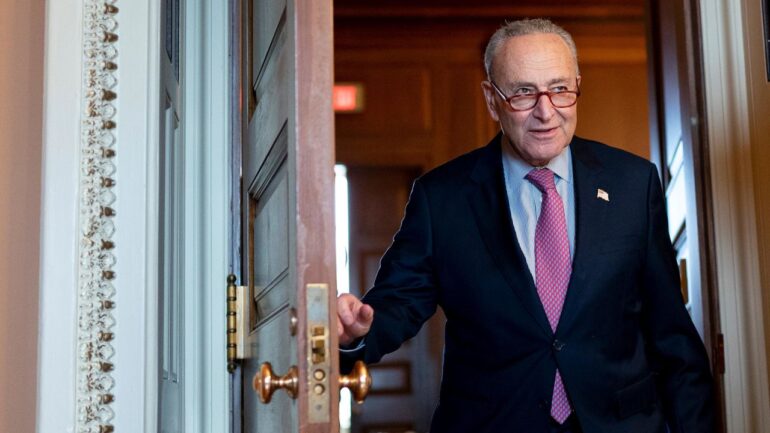TL;DR:
- Senate Majority Leader Chuck Schumer introduces the “SAFE Innovation framework” to advance comprehensive AI legislation.
- The framework focuses on security, accountability, foundations, and explainability as guiding principles.
- Schumer aims to safeguard national security, support responsible AI systems, align AI tools with democratic values and determine transparency requirements.
- The framework emphasizes fostering U.S.-led innovation in AI technologies.
- Schumer plans to convene “AI Insight Forums” to expedite the regulatory process.
- Bipartisanship is crucial for the success of AI bills, and Schumer is working towards building alliances.
Main AI News:
Senate Majority Leader Chuck Schumer has taken a significant step forward in his mission to establish comprehensive AI legislation by introducing his “SAFE Innovation framework.” This framework, which builds upon his previous commitment to federal AI regulations, aims to tackle the complexities surrounding artificial intelligence while adhering to essential principles.
The “SAFE” in Schumer’s framework represents security, accountability, foundations, and explainability, forming the bedrock of his legislative approach toward this rapidly evolving technology. In a speech delivered at the esteemed Center for Strategic and International Studies think tank, Schumer emphasized the importance of confronting AI head-on, stating, “We cannot be ostriches sticking our heads in the sand when it comes to AI.”
Schumer’s vision for comprehensive AI legislation encompasses multiple crucial aspects. It seeks to safeguard both national security and American jobs, ensuring responsible AI systems in combating misinformation, bias, copyright infringement, liability concerns, and intellectual property disputes. Moreover, the legislation aims to establish the alignment of AI tools with democratic values while addressing the degree of transparency required from AI companies by the federal government and private citizens.
The fifth principle of Schumer’s framework revolves around innovation, reflecting his dedication to promoting U.S.-led advancements in AI technologies. Lawmakers are currently considering funding research projects and computational infrastructure, which could elevate productivity and enable American AI companies to compete effectively with their foreign counterparts.
“Innovation must be our North Star,” emphasized Schumer, highlighting the necessity of ensuring the safe implementation of AI. Without adequate regulatory measures in place, he warned that innovation could be stifled or even halted altogether, posing significant risks to society.
Additionally, Schumer announced plans to convene a series of “AI Insight Forums” commencing in the coming autumn. These forums will engage top AI experts to educate Congress on various topics, including the workforce, national security, privacy, explainability, and potential worst-case scenarios. By adopting this approach, Schumer aims to extricate Congress from its slow-moving committee process, allowing for swift and effective regulation of this fast-paced technology.
Recognizing the scarcity of legislative history on this matter, Schumer advocates for a fresh approach, acknowledging the need for a new process. He cautioned against following the traditional path of lengthy congressional hearings with fragmented discussions, asserting that such a course would hinder the development of appropriate policies.
However, these forums are not expected to commence until September, and the approaching presidential election adds a sense of urgency to lawmakers’ efforts, creating a limited timeframe for collaborative work on comprehensive legislation.
During a brief Q&A session following his speech, Schumer disclosed that his office had evaluated the European Union’s AI Act and other foreign endeavors to regulate the industry. He concluded that none of these initiatives had truly captured the world’s imagination, emphasizing the importance of crafting an American proposal. As Schumer described it, the United States stands as the largest and most innovative economy, a global intellectual leader. He expressed his belief that if a robust framework could be formulated, the rest of the world would readily follow suit.
Schumer emphasized the bipartisan nature of any broad-ranging AI bills, highlighting ongoing efforts to build an alliance between Senators Mike Rounds (R-S.D.), Todd Young (R-Ind.), and Martin Heinrich (D-N.M.). Nevertheless, he acknowledged the challenges that lie ahead, stating, “No question about it: This is all exceedingly ambitious.” Schumer expressed his commitment to exerting utmost diligence as they strive to produce comprehensive AI legislation, reinforcing the necessity of humility throughout the process.
Conclusion:
Schumer’s unveiling of the “SAFE Innovation Framework” signals a significant push for comprehensive AI legislation. The framework’s emphasis on security, accountability, and transparency reflects a growing recognition of the complexities and potential risks associated with AI. It also underscores the importance of responsible AI systems that align with democratic values and promotes U.S.-led innovation. The planned “AI Insight Forums” demonstrate Schumer’s commitment to expediting the regulatory process by engaging experts in critical AI-related topics.
The need for bipartisanship and alliances further highlights the recognition of AI’s impact and the necessity of collaboration for effective legislation. This development in AI regulation will likely shape the market by establishing clearer guidelines and standards for AI implementation, fostering innovation, and addressing concerns surrounding security, accountability, and transparency. Businesses operating in the AI sector should stay informed about the evolving legislative landscape and adapt their practices to comply with emerging regulations.

